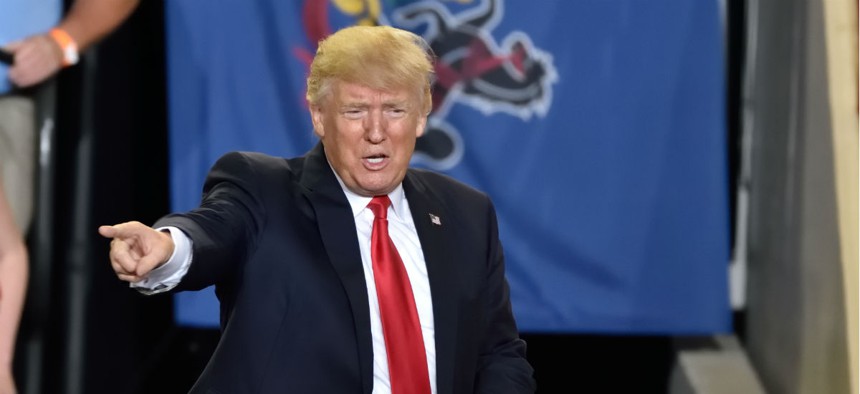
President Trump at a campaign rally in Harrisburg, Pa., in April 2017. Evan El-Amin/Shutterstock.com
Trump Feared Transition Officials Were ‘Stealing’ His Money
In The Fifth Risk, Michael Lewis chronicles the administration’s chaotic struggle to take the reins of government.
Author Michael Lewis deserves credit for some inside-agency scoops in The Fifth Risk, his takedown of the Trump administration’s rocky transition from campaign mode to governing. The title (which refers to the challenges that arise if a project manager is not competent and leaders are shortsighted) spotlights federal heroes unappreciated by incoming Trump appointees, mostly with the Energy, Agriculture, and Commerce departments.
Career civil servants should welcome the fresh eye Lewis brings to the issue. Having long prospered as an explainer of minutiae in areas as far afield as obscure Wall Street investment vehicles to the role of data in Major League Baseball, Lewis successfully exploited his access to well-placed sources.
Perhaps the freshest anecdote is the opener, in which we learn that a newly victorious President-Elect Trump was furious when his key interregnum advisers Chris Christie and Steve Bannon explained that the Presidential Transition Act placed requirements on him—legal requirements. He had wanted them to shut down the newly opened Washington transition office. “You’re stealing my money,” the billionaire businessman said, punctuating with a few F-bombs.
Much of the slim volume, parts of which were previously published in Vanity Fair, documents how Trump appointees tossed out briefing books and made only half-hearted efforts at using the extensive preparations by agencies to orient the incoming appointees.
Lewis quotes an unnamed senior White House official saying, “At most of the federal agencies, there were no real briefings. They were basically for show. The Trump transition team sent in these teams in the end just to say they were doing it.”
Anecdotes abound, however, about dedicated agency specialists who tackle the vital but often-unglamorous work at outfits like the National Weather Service, NASA, the office of the chief scientist at Agriculture, and the Energy Department’s California-based Lawrence Livermore National Laboratory.
What is perhaps less fresh—at least for feds and those who follow federal management issues—is his profile of the very capable president and CEO of the nonprofit Partnership for Public Service.
“In the fall of 2016 Max Stier might have been the American with the greatest understanding of how the U.S. government actually worked,” Lewis effuses. “A few years out of law school he’d met a financier named Sam Heyman, who was as disturbed as Max by how uninterested talented young people were in government work . . . It was Max Stier who had persuaded Congress to pass the laws that made it so annoyingly difficult for Donald Trump to avoid preparing to be president.”
As Stier would be the first to acknowledge, he had many allies over the years in the effort by lawmakers and good-government groups to take the partisan competitiveness out of presidential transitions. Stalwarts like the National Academy of Public Administration and the White House Transition Project are well-known to the inside-the-Beltway good-government crowd.
But Lewis is aiming at a wider audience, one still getting oriented to the risks at hand.
Image via Evan El-Amin/Shutterstock.com.







